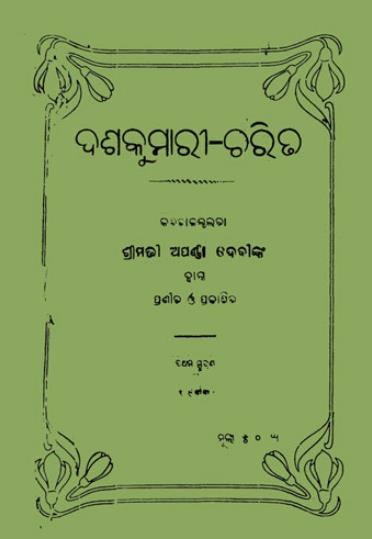The landscape of Odia literature took a significant turn in 1933 with the publication of Dasha Kumari Charita by the acclaimed writer Aparna Debi. This narrative, rich in cultural context and character exploration, offers a profound commentary on the complexities of identity, societal expectations, and the struggles of women in a transforming society. Written during a time when the Odia literary scene was evolving, this story stands out not only for its engaging plot but for its deep psychological insights.
At its heart, Dasha Kumari Charita tells the story of its eponymous heroine, Dasha Kumari, a figure who embodies both resilience and vulnerability. The narrative unfolds through her journey, portraying the various socio-economic challenges she faces in her pursuit of self-identity and acceptance. Aparna Debi’s portrayal of Dasha Kumari is multifaceted; she isn’t merely a victim of her circumstances but a complex character navigating the intricacies of her environment. This depth makes her relatable to readers and provides a significant commentary on women’s roles in society during the early 20th century.
Central to the narrative is the conflict between tradition and modernity—a theme prevalent in many literary works of the period. Dasha Kumari grapples with the expectations placed upon her by society and her family, juxtaposing her dreams and aspirations against the backdrop of conventional norms. As she strives to carve out her path, the reader witnesses her internal struggle, which resonates with the experiences of many women seeking autonomy in a patriarchal society. This universal theme adds a layer of richness to the story, making it relevant even today.
Aparna Debi’s writing style is characterized by lyrical prose and vivid descriptions that bring the setting and characters to life. Her ability to create a strong sense of place allows readers to immerse themselves in the world of Dasha Kumari, witnessing the sights, sounds, and emotions that fill her daily life. This immersive quality is a testament to Debi’s skills as a storyteller, as she crafts a narrative that feels both intimate and expansive.
The story also touches upon various social issues, including class disparity and the pursuit of education. Dasha Kumari’s quest for knowledge emerges as a crucial element in her character development and empowerment. Through her determination to learn and grow, the narrative advocates for the importance of education, especially for women. This progressive viewpoint was especially significant for its time, as it encouraged readers to reflect on the broader implications of education in fostering equality and empowerment.
Another noteworthy aspect of Dasha Kumari Charita is its exploration of relationships. The dynamics between Dasha Kumari and the various characters in her life, including family members and friends, provide insights into the societal norms and personal conflicts that define her journey. These interactions enrich the narrative, showcasing the complexities of human emotions and the impact of societal pressures on individual choices.
Another noteworthy aspect of Dasha Kumari Charita is its exploration of relationships. The dynamics between Dasha Kumari and the various characters in her life, including family members and friends, provide insights into the societal norms and personal conflicts that define her journey. These interactions enrich the narrative, showcasing the complexities of human emotions and the impact of societal pressures on individual choices.
Books Info
| Books name | Dasha Kumari Charita / ଦଶ କୁମାରୀ ଚରିତ |
| Author | AAparna Debi |
| No Of pages | 210 |
| Publisher | NA |
| Publication | 1933 |
| Printed At | NA |
| Distributor | NA |

